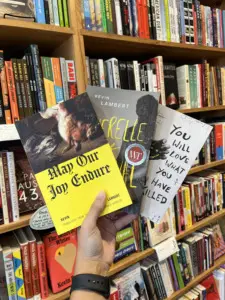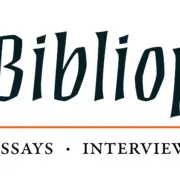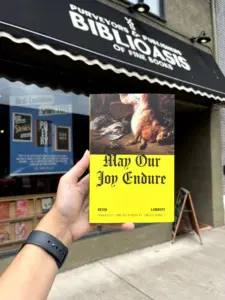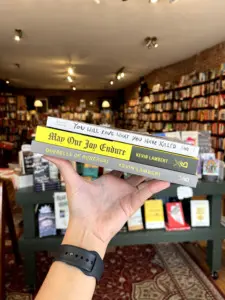The Bibliophile: What A Publisher Does
Want to get new excerpts, musings, and more from The Bibliophile right away? Sign up for our weekly newsletter here!
***
Over the years, whenever I’ve been asked what it is exactly a publisher does, I’ve had a range of answers, depending on how I’m thinking about my role and function at the time. Of late, I’ve described myself as a professional enthusiast. Enthusiasm is probably the state that most links publishing and bookselling for me: finding that book that I can get behind and trumpet into the hands of readers as loudly and as confidently and generously as I can. I take immense pleasure in the discovery of a new (or new-to-me) writer, and in the ability to engender in others that same anticipation and pleasure.
It’s perhaps for this reason that I listen so much to booksellers, and trust them more than I do academics and critics: they still read as I do, or at least as I try to do: for pleasure, excitement, the feeling of quickening when something unexpectedly connects or opens with the turn of the page. I listen to them about what I should be reading (if I could ever get out from under the manuscript pile), but also, just as much, what we should be thinking about publishing. Booksellers have turned me on to several of my favourite Biblioasis authors, and I’m grateful for it.

Photo: May Our Joy Endure, Querelle of Roberval, and You Will Love What You Have Killed by Kev Lambert.
It was in 2018 or 2019, at the Salon des Livres that one such bookseller urged me to look at the work of Kev Lambert. It bothers me that I can’t remember his name at this time, nor even the bookstore he worked at: it was a French language bookstore in Quebec City, and he was there working the Salon for a couple of publishers. During a break he took me by the arm and guided me to a couple of publisher’s booths, including Heliotrope’s, picking up Kev’s just-released Tu aimeras ce que tu a tué. Kev, he told me, was the most original and fearless author to come out of Quebec in at least a generation, and that if this book was anything to go by was a writer we should commit to early. His enthusiasm was contagious, so I sent it immediately to my most trusted reader, who sent me one of the most enthusiastic (and strangest) reader reports I’ve ever had the pleasure to receive. Below: a short excerpt:
Well, I’m rather glad you don’t have to run books by a corporate publishing committee, because I have no idea how to explain this book cogently, let alone come up with a one-line pitch, but I one hundred per cent think you should buy it. Essentially it’s a gay coming-of-age in which the narrator may or may not be a ghost, and lots of children die, who may or may not come back as ghosts. And it’s the funniest, weirdest thing I’ve read for a long time…..It’s The Returned [if that French TV series about dead children coming back to their village made Canadian shores; it became a cult hit in Britain] meets Clerks meets… [hmmm, this is nothing like Houellebecq but it would definitely appeal to people who love Houellebecq]. It’s so weird I’m struggling to come up with book comparisons, it often reads like a film. … And, bloody hell, this guy has written, at 25, one of the most original things I’ve read for quite a while.
***
Translation is, for me, as a monoglot (my kids so regularly tell me that I speak country French that I now no longer try to speak it at all), an act of faith, especially faith in the readers and publishers I’ve come to trust. So we took a leap and published Kevin’s first book, and when I read it in Donald Winkler’s excellent translation (You Will Love What You Have Killed) I had to agree both with my bookseller guide and first reader: this was one of the most strangely original things I’d read. It was like the revenge of the Gashlycrumb Tinies (A is for Amy who fell down the stairs / B is for Basil assaulted by bears). This was a violent, comic, tragic, and lyrical world quite unlike any other. Their next novel, Querelle of Roberval, upped the ante: a novel of a labour strike in a Quebec milltown, it read like a Greek tragedy, ending with infanticide and the striking workers quite literally preparing to eat their rich bosses. It caused a furor in France where it won the de Sade Prize and was shortlisted for the Medici, and in English the Writer’s Trust prize, again in Donald Winkler’s inestimable translation.
This brings me to their third novel May Our Joy Endure, which was published earlier this month, and defies every expectation set by their first couple, beyond, that is, its breathtaking originality. The French version was a sensation, was a Goncourt finalist, and won the Médici and a range of other key awards. Kev has told me that they consider this exploration of the lives of the ultrarich their most violent novel to date, but it is a much more nuanced violence, and because of that so much more unsettling. “Writing Querelle left me with this big question about bosses and the rich,” Lambert told Steven Beattie in an interview for Quill & Quire. “My idea was to try and see the people who were invisible in Querelle. It made sense for me in a social way, because really rich people don’t want to be seen. They don’t want us to see how they live, where they live, what their day-to-day lives can look like.” But he also chose to approach these characters and their situations with as much empathy as possible. “I wanted to challenge the idea that humanizing the person you critique is giving them credit,” Lambert told Beattie. “We hear this sometimes in political or media circles. But I think it’s a fake or a wrong idea.”
This is only one of the things that makes May Our Joy Endure such an important book, and in the words of another reviewer, André Forget in The Walrus, “reveals Lambert to be one of our most subtle and perceptive novelists.” Calling the book “gorgeous, lyrical, and tender—a ballet performed in an abattoir,” Forget explains as well as anyone why Kev Lambert is so essential, and so refreshing in this hyper-politicized literary moment: they eschew playing it safe, pat answers and solutions, which also explains why it is that Biblioasis will continue to follow them anywhere.
Dan Wells
Publisher
***
Keep up with us!
- The Pages of the Sea by Anne Hawk comes out in Canada on September 17, 2024 and in the US on October 1, 2024.
- Comrade Papa by GauZ’ (trans. by Frank Wynne) will be published on October 8, 2024.
- Question Authority by Mark Kingwell will be out on November 5, 2024.
- A Case of Matricide by Graeme Macrae Burnet comes out on November 12, 2024.
- Best Canadian Essays 2025 (ed. Emily Urquhart), Best Canadian Stories 2025 (ed. Steven W. Beattie), and Best Canadian Poetry 2025 (ed. Aislinn Hunter) all publish on November 12, 2024.





